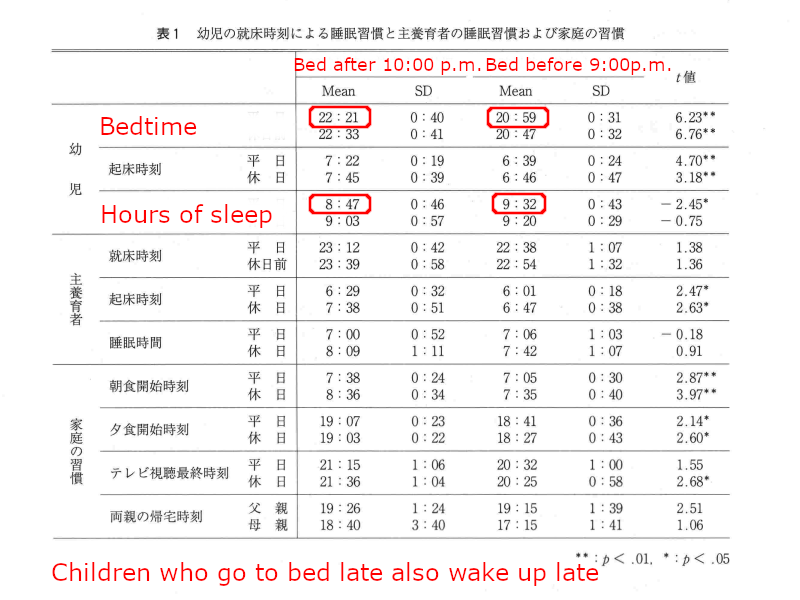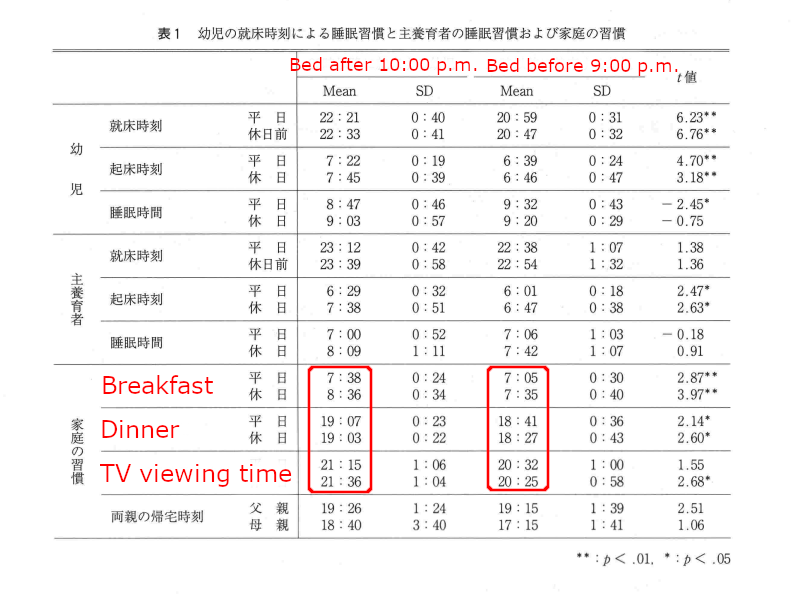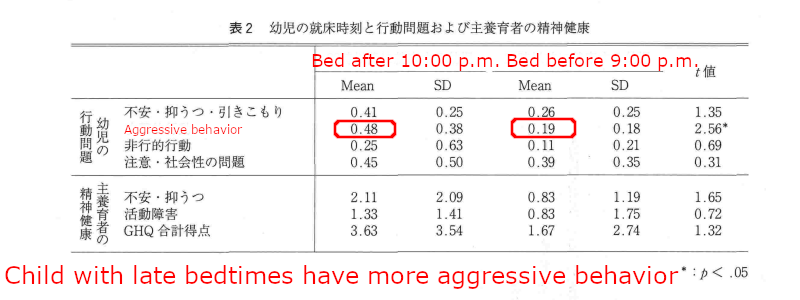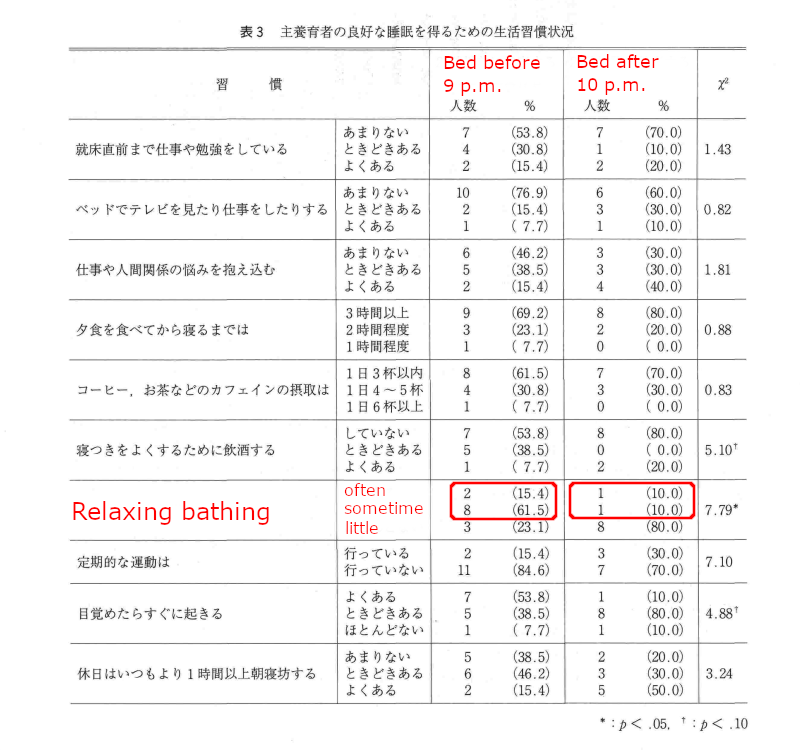Increased number of young children staying up late
The research paper 幼児の夜ふかしと主養育者に対する睡眠教育の重要性 is cited and referred to in this report.
In a 2000 survey, 40% of young children went to bed after 10:00 p.m., about twice as many as in 1990.On the other hand, there has been no significant change in waking time, indicating a clear reduction in sleep duration. Some have pointed out that the lack of sleep among young children is so great that it cannot be compensated for by naps and backward waking times. Factors that have been pointed out as contributing to the shortening of child sleeping hours include the amount of time child spend watching television, the time their parents return home, and the mental health and nurturing attitudes of their parents. It is surmised that in order to review toddlers’ nighttime sleep and lifestyle habits, it is important to first raise awareness of sleep and lifestyle habits among caregivers.
How to improve sleep and lifestyle habits of child?
To improve the sleep and lifestyle habits of young children, ① make the primary caregiver aware that a backward bedtime for young children is also associated with sleep deprivation and increased behavioral problems. ② Raise the end of the toddler’s television viewing time. ③ To review the primary caregiver’s morning activities and dinner time. ④Provide knowledge education for good sleep. These four points are important. So, what is the research method?
Method of investigation
Eligible applicants are 29 pairs of parents and children. Parents and children whose primary caregivers are grandparents or who have developmental disabilities or attend a neuropsychiatric clinic are not included. The child ranged in age from 5 years and 3 months to 6 years and 3 months, 14 boys and 15 girls, and were asked to complete a questionnaire from late June to early July, followed by 3 months of living according to selected lifestyle improvement goals. The lifestyle improvement goals varied from “getting up quickly when I wake up” to “doing 30 minutes of exercises and walking on holidays. After 3 months, the children were asked to answer the same questionnaire and the effect of the lifestyle improvement was examined.
Result
Differences in Habits by Bedtime of Child
The results are divided into two groups: child who go to bed after 10:00 p.m. (later bedtimes) and child who go to bed before 9:00 p.m. (earlier bedtimes). The left side of the table shows data for child who go to bed after 10 p.m., and the right side shows data for child who go to bed before 9 p.m.
A comparison of weekday sleep duration for toddlers shows that toddlers with later bedtimes sleep 45 minutes less than toddlers with earlier bedtimes. In addition, toddlers with later bedtimes also wake up later. Although they try to get more sleep by waking up later, they still get 45 minutes less than toddlers with earlier bedtimes. In terms of satisfaction with sleep duration, 70% of late risers reported that they did not get enough sleep, compared to 21.4% of early risers.

The middle panel of the table compares the sleep habits of the primary caregivers of child who go to bed late and those who go to bed early. There was no difference in bedtime and sleep duration among primary caregivers. However, the primary caregivers of child who went to bed late on both weekdays and holidays woke up later than the primary caregivers.
It is about home habits. Families with young children who go to bed late start breakfast and dinner later in the day. They also found that they finished watching TV later in the day.

Bedtime and behavioral problems in young children
Aggressive behavior was more common when the toddlers went to bed later. There were no differences in anxiety, depression, withdrawal, delinquent behavior, or attention and social problems.

Relationship between lifestyle status and lifestyle improvement goals
The table below shows the lifestyle status of primary caregivers of child who go to bed late (after 10 p.m.) and those who go to bed early (before 9 p.m.) in order to obtain good sleep habits. On the right side of the habits, there are three ratings, the higher the rating, the better the sleep habits. For example, in the item “working or studying until just before bedtime,” there are three levels of “not often,” “sometimes,” and “often,” indicating that it is a good sleep habit not to work or study until just before bedtime. Eighty percent of the primary caregivers of child with early bedtimes indicated that “Relaxing bathing” was a frequent or occasional occurrence. On the other hand, 80% of the primary caregivers of toddlers who go to bed late said that they rarely take a leisurely bath. This is a clear reversal. The primary caregivers of child with early bedtimes tended to “get up as soon as they wake up” and “drink alcohol to help them fall asleep.

What the Survey Results Reveal
Although the results are not shown in the report, when asked whether or not child stay up late, the percentage of those who stay up late was about 20-30% for both child who go to bed after 10:00 p.m. (late child) and those who go to bed before 9:00 p.m. (early child). However, child who were early to bed were late risers, and even if they did stay up late, they went to bed before 10:00 p.m. This indicates that different perceptions of bedtime for child among primary caregivers. This suggests that the primary caregivers of child who go to bed after 10:00 p.m. do not consider bedtimes after 10:00 p.m. to be late.
Child go to bed at the same time as adults, and adults may get enough sleep, but not enough for child. One of the causes of nighttime wakefulness among young children is the amount of time they spend watching television. There were no differences in the main caregiver’s bedtime and sleep time, or in the time of return home in terms of family customs, but there were differences in the time dinner was started. Furthermore, there were also differences in the primary caregiver’s wake-up time and breakfast start time, suggesting that the primary caregiver’s wake-up time may be related to overall family habits as a whole. Therefore, in order to improve the sleep habits of the primary caregivers themselves, it is first necessary to make them aware of the need to wake up earlier. And getting up as soon as possible after awakening is an important habit to regulate the rhythm of the day. Although a higher percentage of primary caregivers of child with early bedtimes drank alcohol as a habit, drinking to sleep is not recommended. Drinking to sleep is not recommended, as the effects of drinking to sleep gradually increase and diminish. However, we can read that the primary caregivers of child with early bedtimes do something to help them sleep. Late bedtimes for young children do not cause anxiety, depression, or other problems, but they do increase aggressive behavior. In addition, shorter sleep duration has been associated with decreased daytime activity, lower academic performance, and increased aggression and irritability. Some reports suggest that sleep problems, especially in early childhood, are also associated with behavioral and emotional problems in adolescence.
Related Articles
I tried to raise awareness and attempt
I have two sons, ages 4 and 1.
Both sleep late and would get under the covers around 10pm. Even after getting under the covers, they stay awake for a while and do not fall asleep right away. In the morning I wake them up before 7:00 a.m., but they don’t wake up easily, saying they are sleepy, sleepy, and when they do wake up, they are lazy and sluggish. Even then, I leave the house at around 7:40 a.m. and take him to daycare. I get home from work around 7pm. If the child has not eaten when I get home, I put him in the shower. If it is before dinner, the child says, “I want to eat first. But I prioritize showering as much as possible. This is because they think that a full stomach makes it difficult for them to move around. When the children finish their dinner and shower around 8:00 p.m., they are free to watch TV for about an hour. Around 9:00 p.m., they brush their teeth, go to the bathroom, and get ready for bed. Then I do laundry, brush my teeth, and get ready for bed (the TV is still on during that time), and I go to bed with the kids around 10pm. I would like to go to bed with the kids alone, but they won’t go to bed alone.
I have noticed that this habit, especially television time, is very long. The TV must be on for an hour and a half to two hours, not just an hour of free time. Because it is on even when I am brushing my teeth. I set the time for brushing my teeth around 8:00 to 8:30 p.m., because even though the TV is on, I can still brush my teeth. Then my kids went to bed about 30 minutes to an hour earlier! It may work because the child has a habit of “brush teeth, toilet, bedding, sleep” and that habit has not been broken. Right now they are taking a shower, but if they take a bath, it should be even more effective.



コメント